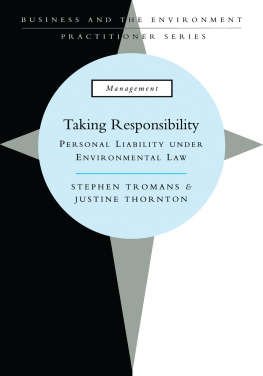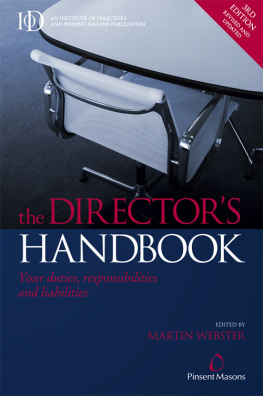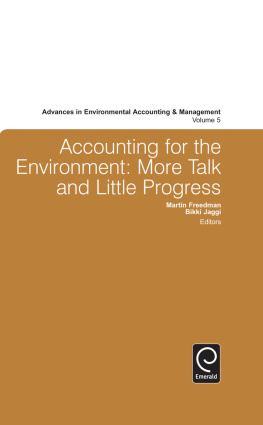TAKING RESPONSIBILITY
TAKING RESPONSIBILITY
PERSONAL LIABILITY UNDER ENVIRONMENTAL LAW
Stephen Tromans and Justine Thornton
First published in the UK and USA in 2001 by
Earthscan Publications Ltd
This edition published 2013 by Earthscan
For a full list of publications please contact:
Earthscan
2 Park Square, Milton Park, Abingdon, Oxon OX14 4RN
Simultaneously published in the USA and Canada by Earthscan
711 Third Avenue, New York, NY 10017
Earthscan is an imprint of the Taylor & Francis Group, an informa business
Copyright Stephen Tromans and Justine Thornton, 2001
All rights reserved. No part of this book may be reprinted or reproduced or utilised in any form or by any electronic, mechanical, or other means, now known or hereafter invented, including photocopying and recording, or in any information storage or retrieval system, without permission in writing from the publishers.
A catalogue record for this book is available from the British Library
ISBN: 978-1-85383-597-1 (pbk)
Cover design by Andrew Corbett
TABLE OF CONTENTS
Stephen Tromans
Stephen Tromans MA (Cantab), Barrister, practices at 11 Kings Bench Walk, specialising in environmental law and related areas. He is a Research Professor in Environmental Law at Nottingham Law School and the author of numerous books and other publications, including The Environment Acts 199095, Planning Law, Practice and Precedents, Contaminated Land and the The Law of Nuclear Installations and Radioactive Substances. He has advised the UK Parliamentary Committee on environmental issues and speaks widely on these topics in the UK and abroad.
Justine Thornton
Justine Thornton MA (Cantab), Barrister, is a member of the Environment Department at Simmons & Simmons, solicitors. She practised at the bar and worked in the Environment Department at the European Commission before joining Simmons & Simmons. She is co-author of Environmental Law (Sweet & Maxwell) and has published a number of articles on environmental issues in journals and newspapers. She lectures regularly on environmental law in Europe, the US and in the former Soviet states.
A person who accepts the office of director of a particular company undertakes the responsibility of ensuring that he or she understands the nature of the duty a director is called upon to perform
(Daniels v Anderson [1995] 12 ACLC 614)
STOP PRESS
A new criminal offence of corporate killing has been proposed by the Government. The offence will cover deaths caused by management failure in a company where its conduct has fallen far below what could reasonably be expected.
Disasters like the sinking of the Herald of Free Enterprise, the Kings Cross fire, the Clapham rail crash and the Southall rail crash prompted calls for changes in the law. None of the companies involved could be prosecuted for manslaughter despite the fact that inquiries found them to be at fault and meriting serious criticism.
23 May 2000
For companies operating in the 21st century environmental issues are a key element of good corporate governance. The environment may not seem to matter that much when set against the traditional big corporate management issues. Companies are unlikely to be financially crippled by a typical fine for an environmental offence nor by damages from a single pollution incident. Looking at single events, however, misses the point: what is at issue is the cumulative effects of a policy of environmental responsibility or a lack of it. Today, there are too many environmental banana skins around for comfort. Slipping on one can be costly in several ways in terms of direct liabilities, corporate image and morale, loss of confidence by regulators and actual or potential business partners, and in management time and effort.
What is true for a company is also true for its directors. Making directors personally liable for the actions of their companies is increasingly regarded as one of the most effective ways of protecting the environment. In addition, the standard of care and skill expected from directors is increasing. It is no longer enough for a director to rely on what he already knows. He must make sure he understands the role he is being asked to perform and perform, to an appropriate standard. He will not be able to pass his personal responsibility on to fellow directors, management and staff to the extent that he may have done in the past.
AC | Appeal Cases Report |
BIL | Bata Industries Limited |
BSO | Bata Shoe Organisation |
EMS | environmental management system |
ENDS | Environmental Data Services Report |
Env LR | Environmental Law Reports |
EPA | Environmental Protection Act 1986 (Canada) |
All ER | All England Reports |
HSE | Health and Safety Executive |
IPC | integrated pollution control |
IPPC | integrated pollution prevention and control |
OWRA | Ontario Water Resources Act |
QB | Queens Bench |
Few people, when they become company directors, will spend a lot of time worrying about whether or not their appointment could result in having to face a criminal charge. We all know of the well publicised cases where directors and other officers have been accused of fraud, false accounting, insider dealing and the like. Less obvious is the risk of personal liability under environmental legislation, but these risks may well affect the honest director as well as the crook.
Consider the following extract from The Times.
Pollution Danger for Owner Managers
Owner managers of small businesses will face an increased risk of fines and even prison this year if they breach the growing list of environmental regulations. In 1998 a man was jailed while five others and a company were ordered to pay fines and costs totalling 98,000 for asbestos waste offences. Roger Adams, head of the technical research department of the Association of Chartered Certified Accountants says: These days, company directors can go to prison for a wide range of environmental offences (The Times, 19.01.99).
The threat of personal liability is seen increasingly as one of the most effective ways of improving corporate responsibility under legislation for the protection of the environment. This is not a new idea:
I think it would be a very good thing, instead of having fines as the punishment for breach of the law, to make it imprisonment, and flogging and pillory; I have no doubt that would keep them to it. (Mr Richard Oastler, addressing a select committee at the House of Commons on early factory safety legislation, 1831).
In its enforcement policy (published in November 1999) the Environment Agency has stated that it will identify individuals, including company directors and managers, if it considers that a conviction is warranted and can be secured.












